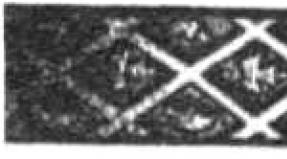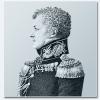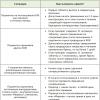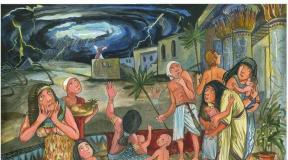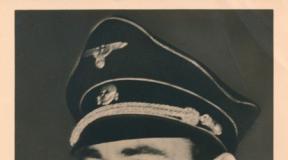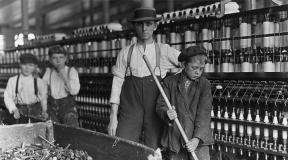Denikin history. Formation and functioning of the Volunteer Army. Commander of the Russian Imperial Army
DENIKIN Anton Ivanovich(1872-1947), Russian military figure, lieutenant general (1916). During the First World War he commanded a rifle brigade and division, an army corps; from April 1918 commander, from October commander-in-chief of the Volunteer Army, from January 1919 commander-in-chief of the "Armed Forces of the South of Russia" (Volunteer Army, Don and Caucasian Cossack armies, Turkestan army, Black Sea Fleet); simultaneously with January 1920 "Supreme ruler of the Russian state." From April 1920 in exile. Works on the history of the Russo-Japanese War; memoirs: "Essays on Russian Troubles" (vols. 1-5, 1921-23), "The Way of a Russian Officer" (1953).
DENIKIN Anton Ivanovich(December 4, 1872, the village of Shpetal-Dolny Vlotslav, Warsaw province - August 7, 1947, Ann Arbor, USA), Russian military leader, one of the leaders of the white movement, publicist and memoirist, lieutenant general (1916).
The beginning of a military career
Father, Ivan Efimovich Denikin (1807-1855), came from serfs. In 1834 he was handed over to the recruits by the landowner. In 1856 he passed the exam for an officer's rank (he was promoted to ensign). In 1869 he retired with the rank of major. Mother, Elizaveta Fedorovna, nee Vrzhesinskaya (1843--1916), Polish by nationality, came from a family of small landowners.
He graduated from the Lovichsky real school, the military school course of the Kiev infantry cadet school (1892) and the Imperial Nikolaev Academy of the General Staff (1899). He served in the 2nd Field Artillery Brigade (1892-95 and 1900-02), was a senior adjutant of the headquarters of the 2nd Infantry Division (1902-03) and the 2nd Cavalry Corps (1903-04). During Russo-Japanese War in March 1904 he filed a report on transfer to the active army and was appointed staff officer for special assignments at the headquarters of the 8th Army Corps; in the theater of operations, he served as chief of staff of the Transbaikal Cossack, then the Ural-Transbaikal division, in August 1905 he took over as chief of staff of the Consolidated Cavalry Corps (at the same time he was promoted to the rank of colonel "for military distinctions"). Awarded with the Order of St. Stanislav and St. Anna 3rd class with swords and bows and 2nd class with swords.
In 1906-10 - in various staff positions in the General Staff; in 1910-14 - commander of the 17th Archangelsk infantry regiment. In March 1914 he was appointed acting general for instructions from the headquarters of the Kiev military district, and in June he was promoted to major general.
As early as the 1890s, Denikin's political outlook took shape: he perceived Russian liberalism "in its ideological essence, without any party dogmatism", sharing its three positions: "constitutional monarchy, radical reforms and peaceful ways of renewing Russia." From the end of the 1890s, under the pseudonym Ivan Nochin, he published a lot in the military press, mainly in the most popular magazine "Scout", in which in 1908-14 he published a series of articles "Army Notes". He advocated an improvement in the system of selection and training of command personnel, against bureaucracy, the suppression of initiative, rudeness and arbitrariness in relation to soldiers; devoted a number of articles to the analysis of the battles of the Russo-Japanese War, in which he personally participated. He pointed to the German and Austrian threat, in the light of which he considered it necessary to carry out speedy reforms in the army; in 1910 he proposed convening a congress of officers of the General Staff to discuss the problems of the army; wrote about the need for the development of motor transport and military aviation.
During the First World
Having learned about the beginning of the war, Denikin filed a report with a request to send him into service. In September 1914 he was appointed commander of the 4th Iron Rifles Brigade. "Iron arrows" distinguished themselves in many battles of 1914-16, they were thrown into the most difficult areas; they were nicknamed the "fire brigade". For differences in battles, Denikin was awarded the St. George weapon, the Order of St. George 4th and 3rd degrees. For breaking through enemy positions during the offensive of the South-Western Front in 1916 and the capture of Lutsk, he was again awarded the St. George weapon, decorated with diamonds and promoted to lieutenant general. In September 1916 he was appointed commander of the 8th Army Corps.
February Revolution
Denikin's military career continued to go up after the February Revolution. In April 1917 he was appointed chief of staff of the Supreme Commander-in-Chief, then in May - commander-in-chief of the armies of the Western Front, in July - commander-in-chief of the armies of the Southwestern Front. He sharply criticized the policy of the Provisional Government, leading to the collapse of the army, at the officers' congress in May 1917. At a meeting at Headquarters on July 16, in the presence of members of the Provisional Government, he delivered a speech in which he formulated an 8-point army strengthening program, which actually contained the requirement the abolition of democratic gains in the army. On August 27, 1917, having received news of the speech of General L. G. Kornilov, he sent a telegram to the Provisional Government in support of its demands - bringing the war to a victorious end and convening a Constituent Assembly. On August 29, he was arrested and placed in a guardhouse in Berdichev, then transferred to Bykhov, where Kornilov and his associates were imprisoned. On November 19, 1917, by order of the Supreme Commander-in-Chief, General N. N. Dukhonin, he was released from arrest, like some others arrested in the Kornilov case; with documents in a false name made his way to the Don.
Leading the Volunteer Army
In the late autumn of 1917 he arrived in Novocherkassk, where he took part in the organization and formation of the Volunteer Army. He sought to smooth out the differences between generals M. V. Alekseev and Kornilov, initiated the division of powers between them, as well as the Don ataman A. M. Kaledin. On January 30, 1918, he was appointed head of the 1st Volunteer Division. In the 1st Kuban ("Ice") campaign - Deputy Commander of the Volunteer Army, General Kornilov. On March 31 (April 13), 1918, after the death of Kornilov near Ekaterinodar, he took command of the Dobrarmia. He abandoned Kornilov's plan to storm Yekaterinodar, considering it suicidal, which made it possible to save the army. In June 1918, he undertook the 2nd Kuban campaign, during which Yekaterinodar was taken on July 3, 1918. On September 25 (October 8), 1918, after the death of General Alekseev, he became Commander-in-Chief of the Good Army. From January 1919, after the consent of the Don ataman, General P. N. Krasnov, to the creation of a unified command and subordination of the Don Army to Denikin, he was Commander-in-Chief of the Armed Forces of the South of Russia (VSYUR). Not wanting to split the anti-Bolshevik movement, in May 1919 he recognized Admiral A. V. Kolchak as the "supreme ruler" of Russia; in January 1920, the powers of the "supreme ruler" were transferred by Admiral Denikin.
The greatest successes of Denikin's troops came in the summer - early autumn of 1919. On June 20, in the newly taken Tsaritsyn, Denikin signed the "Moscow directive" - on the attack on Moscow. However, the general did not take into account the peculiarities civil war, as well as the specifics of the areas where his troops were mainly deployed. Denikin failed to put forward an attractive program, focusing on the doctrine of "non-predecision" (refusal to decide on the form of government before the expulsion of the Bolsheviks), the agrarian reform program was not developed. The Whites failed to organize the work of the rear, in which speculation and corruption flourished, and the supply system of the army, which led to "self-supply" and a fall in discipline, the degeneration of the army into a gang of robbers and rioters, which was especially pronounced in Ukraine, where Jewish pogroms were carried out by the Whites . Denikin was accused of a strategic miscalculation - "the march on Moscow" led to the fact that the front was stretched, supplies were difficult, the Whites occupied vast territories that they were not able to hold. The attack on Moscow in two directions led to the dispersal of forces and made the troops extremely vulnerable to counterattacks by the Reds. In response to these accusations, Denikin reasonably pointed out that a civil war has special laws and it is impossible to approach operations only from the point of view of military strategy. But Denikin's troops undoubtedly achieved great success in comparison with other anti-Bolshevik fronts; in October 1919 they took Orel, and their forward detachments were on the outskirts of Tula.
However, the offensive bogged down, Denikin was forced to retreat rapidly. In March 1920, the retreat ended with the "Novorossiysk catastrophe". When the white troops pressed to the sea evacuated in a panic, and a significant part of them were captured. Shocked by the catastrophe, Denikin resigned and after April 4, 1920 handed over command to General P. N. Wrangel, he left Russia forever.
In exile
In Europe, Denikin experienced all the hardships associated with his forced emigration. First, in the spring of 1920, he ended up in Constantinople, soon ended up in London, and in August he left for Brussels. Being extremely scrupulous in financial matters, Denikin did not secure a livelihood; primarily due to material circumstances, his family moved to Hungary in June 1922, eventually settling in a place near Lake Balaton (it was in Hungary that his most famous book, Essays on Russian Troubles, 1921-1926, was written). In 1925 the Denikins returned to Brussels, and in 1926 they moved to Paris.
"Essays on Russian Troubles", published already in Paris, combined elements of memoirs and research. Denikin relied not only on the memory and materials of his archive; at his request, various documents were sent to him, members of the white movement put at his disposal their unpublished memoirs. "Essays" to this day are the most complete and valuable source on the history of the white movement in southern Russia; are read with growing interest and are written in expressive Russian.
His books The Officers (1928) and The Old Army (1929) were also published in Paris.
Literary earnings and fees from lecturing were the only means of his existence. In the 1930s, in the face of a growing military threat, he wrote and lectured extensively on problems of international relations; occupied an anti-Nazi position, which in no way meant his reconciliation with the Soviet regime. Published in Paris books and pamphlets "The Russian Question in the Far East" (1932), "Brest-Litovsk" (1933), "Who saved the Soviet government from destruction?" (1937), "World events and the Russian question" (1939). In 1936-38 he was published in the newspaper "Volunteer" and some other Russian-language publications .. After the capitulation of France in June 1940, the Denikins moved to the south of France in the town of Mimizan, near Bordeaux. The former general was very upset by the defeat of the Red Army and rejoiced at its victories, however, unlike many emigrants, he did not believe in the degeneration of Soviet power.
In May 1945 he returned to Paris, but, fearing forcible deportation to the USSR, he left for the USA six months later. In May 1946, he wrote in a private letter: "The Soviets bring a terrible disaster to the peoples, striving for world domination. Their impudent, provocative, threatening former allies, raising a wave of hatred, their policy threatens to turn into dust everything that has been achieved by the patriotic upsurge and the blood of the Russian people." In the United States, he continued to work on memoirs that he had begun in France. Died of a heart attack. He was buried with military honors at Evergreen Cemetery (Detroit); On December 15, 1952, Denikin's ashes were transferred to the Russian cemetery of St. Vladimir in Jackson (New Jersey).
The Denikin archive is stored in the library of the Institute for the Study of Russian and Eastern European History and Culture at Columbia University in New York.
General Staff Lieutenant General Denikin A.I. *)
DENIKIN Anton Ivanovich (1872-1947), Russian military figure, lieutenant general (1916). In the 1st World War he commanded a rifle brigade and division, an army corps; from April 1918 commander, from October commander-in-chief of the Volunteer Army, from January 1919 commander-in-chief of the "Armed Forces of the South of Russia" (Volunteer Army, Don and Caucasian Cossack armies, Turkestan army, Black Sea Fleet); simultaneously with January 1920 "Supreme ruler of the Russian state." From April 1920 in exile.
Commander-in-Chief of the VSYUR, General Staff Lieutenant General Denikin A.I.,
1919, Taganrog. *)
DENIKIN Anton Ivanovich (1872, village of Shpetal Dolny, Warsaw province. - 1947, Ann Arbor, Michigan, USA) - military figure, one of the leaders of the white movement. Born into a poor family of a retired major, a former serf. In 1882 - 1890 he studied at the Lovichsky real school and showed brilliant abilities in mathematics. Dreaming from childhood military service, in 1892 he graduated from the Kiev infantry cadet school. In 1899 he graduated from the Academy of the General Staff and was promoted to captain. In 1898 in a military journal. "Scout" was the first story published by Denikin, after which he worked hard in military journalism. He expressed the essence of his political sympathies as follows: "1) Constitutional monarchy, 2) Radical reforms, and 3) Peaceful ways of renewing the country. I carried these worldviews inviolably until the revolution of 1917, without taking an active part in politics and devoting all my strength and labor to the army." During Russo-Japanese War 1904 - 1905 showed excellent qualities as a military officer, rising to the rank of colonel, and was awarded two orders. He reacted extremely negatively to the revolution of 1905, but welcomed the Manifesto of October 17, considering it the beginning of transformations. believed that the reforms P.A. Stolypin will be able to resolve the main question of Russia - the peasant. Denikin served successfully and in 1914 was promoted to major general.
 With the outbreak of the First World War, he commanded a brigade, a division. The valor of Denikin, shown in battles, the highest awards (two St. George's crosses, St. George's weapons, decorated with diamonds) lifted him to the top of the military hierarchy. The February Revolution of 1917 stunned Denikin: "We were not at all prepared either for such an unexpectedly quick denouement, or for the forms that it took." Denikin was appointed Assistant Chief of Staff to the Supreme Commander-in-Chief, commanded the West, then the South-West. front. In an effort to contain the collapse of the empire, he demanded the introduction of the death penalty not only at the front, but also in the rear. I saw a strong personality in L. G. Kornilov and supported his rebellion, for which he was arrested. Liberated N.N. Dukhonin
Denikin, like other generals, fled to the Don, where, along with M.V. Alekseev
,
L.G. Kornilov
,
A. M. Kaledin
was involved in the formation of the Volunteer Army. Participated in the 1st Kuban ("Ice") campaign.
With the outbreak of the First World War, he commanded a brigade, a division. The valor of Denikin, shown in battles, the highest awards (two St. George's crosses, St. George's weapons, decorated with diamonds) lifted him to the top of the military hierarchy. The February Revolution of 1917 stunned Denikin: "We were not at all prepared either for such an unexpectedly quick denouement, or for the forms that it took." Denikin was appointed Assistant Chief of Staff to the Supreme Commander-in-Chief, commanded the West, then the South-West. front. In an effort to contain the collapse of the empire, he demanded the introduction of the death penalty not only at the front, but also in the rear. I saw a strong personality in L. G. Kornilov and supported his rebellion, for which he was arrested. Liberated N.N. Dukhonin
Denikin, like other generals, fled to the Don, where, along with M.V. Alekseev
,
L.G. Kornilov
,
A. M. Kaledin
was involved in the formation of the Volunteer Army. Participated in the 1st Kuban ("Ice") campaign.
After the death of Kornilov in 1918, he took the post of Commander-in-Chief of the Armed Forces of the South of Russia. With an army of 85,000, material assistance from England, France, and the United States, Denikin hatched plans for the capture of Moscow. Taking advantage of the fact that the main forces of the Red Army fought against A.V. Kolchak , Denikin in the spring of 1919 launched the Volunteer Army on the offensive. In the summer of 1919, Denikin occupied the Donbass, reached a strategically important line: Tsaritsyn, Kharkov, Poltava. Oct. he took Orel and threatened Tula, but Denikin could not overcome the remaining 200 miles to Moscow. The mass mobilization of the population into Denikin's army, robberies, violence, the establishment of military discipline at militarized enterprises, and most importantly, the restoration of landlords' property rights to land doomed Denikin to failure. Denikin was personally honest, but his declarative and vague statements could not captivate the people. Denikin's position was aggravated by internal contradictions between him and the Cossack elite, who aspired to separatism and did not want the restoration of "one and indivisible Russia." The struggle for power between Kolchak and Denikin prevented coordinated military operations. Denikin's army, suffering heavy losses, was forced to retreat. In 1920, Denikin evacuated the remnants of his army to the Crimea and on April 4. 1920 left Russia on an English destroyer. Lived in England. Having abandoned the armed struggle against the Bolsheviks, Denikin wrote a 5-volume memoir-study "Essays on Russian Troubles", important source on the history of the civil war. Financial difficulties forced Denikin to wander around Europe. In 1931, he completed work on a major military-historical study, The Old Army. After Hitler came to power, Denikin declared that it was necessary to support the Red Army, which, after the defeat of the Nazis, could be used to "overthrow the communist regime." He spoke out with the condemnation of emigrant organizations that collaborated with Nazi Germany. In 1945, under the influence of rumors about the possibility of forced deportation to the USSR, the United States emigrated. Denikin worked on the book. "The Way of the Russian Officer" and "Second World War. Russia and Abroad", which he did not have time to complete. He died of a heart attack.
Used materials of the book: Shikman A.P. Figures national history. Biographical guide. Moscow, 1997

General for assignments at the headquarters of the Kiev military district,
of the General Staff, Major General Denikin A.I. *)
In the revolution of 1917
DENIKIN Anton Ivanovich (December 4, 1872, Lovich, near Warsaw, - August 7, 1947. Ann Arbor, Michigan, USA). The son of a major, a native of serfs. He graduated from the Lovichsky real school, in 1892 - the Kiev infantry. cadet school, in 1899 - the Academy of the General Staff. He served in the military headquarters of the Warsaw Military District. Member of Russian-Japanese. wars of 1904-05. From March 1914 at the headquarters of the Kiev Military District; since June - Major General. After the start of the 1st world. war com. brigades, divisions, from Sept. 1916 - 8th arm. Corps of the 4th Army Rum. front.
From con. March 1917 at Headquarters, pom. early headquarters of the Commander-in-Chief, from April 5. to May 31st Headquarters of the Commander-in-Chief Gen. M.V. Alekseeva . Fought to limit the powers of soldiers. set of households. functions, for increasing the representation of officers in them, sought to prevent the creation of committees in divisions, corps, armies and on the fronts. On the sent military. min. A.I. Guchkov project to create a system of soldiers. org-tions with fairly broad powers, developed in the Zap. front, replied with a telegram: "The project is aimed at the destruction of the army" (Miller V.I., Sold. to-you of the Russian army in 1917, M., 1974, p. 151).
Speaking at the officer congress in Mogilev (May 7-22), he said: " Due to the inevitable historical laws, the autocracy fell, and the country passed to democracy. We stand on the verge of a new life... for which we carried our heads on the chopping block, languished in the mines, many thousands of idealists languished in the tundra". However, Denikin emphasized: "we look to the future with anxiety and bewilderment," "for there is no freedom in the roar. dungeon", "there is no truth in the fake bunks. voices", "there is no equality in the persecution of classes" and "there is no strength in that crazy bacchanalia, where everyone around is trying to snatch everything that is possible at the expense of the tormented Motherland, where thousands of greedy hands are reaching for power, shaking its foundations" (Denikin A.I. ., Essays on Russian Troubles, The Collapse of Power and the Army, February-September 1917, Moscow, 1991, p. that the Russian officers were left with “everything that is honest, thinking, everything that has stopped on the verge of common sense, now abolished.” “Take care of the officer! - Denikin called - For from a century to the present, he stands faithfully and unchangingly on guard of the Russian. statehood" (ibid., pp. 367-68).
New Glavkoverkh A.A. On May 31, Brusilov appointed Denikin commander-in-chief of the Zap. front. On June 8, announcing his assumption of office to the troops of the front, he declared: I firmly believe that victory over the enemy is the key to the bright life of the Russian land. On the eve of the offensive, which decides the fate of the Motherland, I call on everyone who has a feeling of love for her to do their duty. There is no other way to the freedom and happiness of the Motherland" ("Orders of the Commander-in-Chief of the Armies of the Western Front. 1917", No. 1834, TsGVIA. B-ka, No. 16383).
After the failure of the front offensive (July 9-10), at a meeting at Headquarters, in the presence of members of the Provisional Government, he delivered a speech on July 16 in which he accused the government of the collapse of the army and put forward an 8-point program to strengthen it: " 1) Consciousness of their mistake and guilt by the Provisional Government, which did not understand and did not appreciate the noble and sincere impulse of the officers, who joyfully accepted the news of the coup and gave an uncountable number of lives for the Motherland. 2) Petrograd, completely alien to the army, not knowing its way of life, life and historical foundations of its existence, to stop all military legislation. Full power to the Supreme Commander, responsible only to the Provisional Government. 3) Remove politics from the army. 4) Cancel the "declaration" (of the rights of a soldier) in its main part. Abolish commissars and committees, gradually changing the functions of the latter. 5) Return power to the bosses. Restore discipline and outward forms of order and decency. 6) Make appointments to senior positions not only on the basis of youth and determination, but, at the same time, on the basis of combat and service experience. 7) To create in the reserve of chiefs selected, law-abiding units of the three types of weapons as a support against a military revolt and the horrors of the upcoming demobilization. 8) Introduce revolutionary military courts and the death penalty for the rear - troops and civilians who commit identical crimes"(Essays on Russian Troubles", pp. 439-40). "You have trampled our banners into the mud," Denikin addressed the Time. pr-vu- Now the time has come: raise them and bow before them "(ibid., p. 440). Later, evaluating Denikin's program, outlined on July 16, the emigrant historian General N.N. Golovin wrote: "Although General Denikin and does not utter these words ["military dictatorship" - Authors], but the requirements set forth in paragraphs 2, 3, 4, 5 and 8 could only be carried out by military force" (see: Polikarpov VD., Military counterrevolutionary -tion in Russia, 1904-1917, Moscow, 1990, p. 215).
Aug 2 appointed Commander-in-Chief of the Yugo-Zal, Front (instead of Gen. L.G. Kornilov , from July 19 of the Commander-in-Chief). Upon taking office on 3 Aug. issued an order, in which he called on "all the ranks in whom the love for the Motherland has not faded, stand firmly in defense of Russian statehood and devote their work, mind and heart to the cause of reviving the army. Put these two principles above political hobbies, party. intolerance and grievous insults inflicted on many in the days of insane frenzy, for only fully armed with state order and strength will we turn the "fields of shame" into fields of glory and through the darkness of anarchy we will lead the country to the Church. ("Orders of the commander-in-chief of the armies of the South-Western Front, 1917", No. 875, TsGVIA, B-ka, No. 16571). Aug 4 in Order No. 876 announced the restriction of the activities of the military to-tov within the framework of the existing military. legislation; ordered to-there not to expand, and the chiefs not to narrow their competence (ibid.).
On August 27, having received a message about Kornilov's speech, he sent Temp. pr-vu telegram: "... Today I received news that General Kornilov, who made certain demands that could still save the country and the army, is being removed from the post of Commander-in-Chief. Seeing this as the return of power to the path of systematic destruction of the army and, consequently, the death of the country , I consider it my duty to bring to the attention of the Provisional Provision that I will not go along this path with him "(Essays on Russian Troubles", pp. 467-68).
Aug 29 Denikin and his supporters in the South-West. front were arrested and imprisoned in Berdichev prison, later transferred to Bykhov. Nov 19 by order of the Commander-in-Chief, Gen. N.N. Dukhonin was released from custody along with other generals. He fled to the Don, after 3 days he arrived in Novocherkassk. Participated in the formation of Dobrovolch. army. In an effort to resolve differences between Alekseev and Kornilov, initiated a compromise, in accordance with the Crimea, Alekseev was in charge of civil. control, external relations and finances, and Kornilov had a military. power; chieftain A. M. Kaledin belonged to the administration of the Don region. During the 1st Kuban ("Ice") campaign, Denikin was the beginning. Volunteer divisions of almost all formations of the Dobrarmia), then pom. commands. Kornilov's army, and after his death he was appointed commander of the army by Alekseev on April 12, 1918. In December 1918, he assumed command of "all land and sea forces operating in the south of Russia." In the spring of 1920, after the defeat of the White Guard troops, he was evacuated to the Crimea, where he transferred command to the gene. P.N. Wrangel . and went abroad. Lived in France; retired from political activity. In the 1930s, anticipating a German war against the USSR, " wished the Red Army that, having repelled the German invasion, it would defeat the German army, and then liquidate Bolshevism"(Meisner D., Mirages and reality, M., 1966. p. 230-31). During the years of the 2nd world war of 1939-45, he condemned emigre organizations that collaborated with Nazi Germany.
The materials of the article by V.I. Miller, I.V. Obedkov and V.V. Yurchenko in the book: Politicians of Russia 1917. biographical dictionary. Moscow, 1993 .

Romanovsky, Denikin, K.N. Sokolov. Stand N.I. Astrov, N.V.S,
1919, Taganrog. *)
In the White movement
Denikin Anton Ivanovich (1872-1947) - Lieutenant General of the General Staff. The son of an officer of the border guards, who has served as a soldier. He graduated from the Lovichsky real school, military school courses at the Kiev infantry cadet school and the Nikolaev Academy of the General Staff (1899). From the school he went to the 2nd artillery brigade. In 1902 he was transferred to the General Staff and appointed to the post of senior adjutant of the 2nd Infantry Division. From 1903 to March 1904 - senior adjutant of the headquarters of the 2nd cavalry corps. During the Russo-Japanese War in March 1904, he filed a report on transfer to the active army and was appointed as a staff officer for special assignments at the headquarters of the 8th Army Corps, where he served as chief of staff of the 3rd Zaamur Border Guard Brigade. Lieutenant colonel. Since September 1904, he was a headquarters officer for special assignments at the headquarters of the 8th Army Corps, where on October 28 of the same year he was appointed to the post of chief of staff of the Trans-Baikal Cossack Division, General Rennenkampf. In February 1905, he assumed the post of chief of staff of the Ural-Transbaikal division as part of the cavalry detachment of General Mishchenko. In August 1905 he was appointed chief of staff of the Consolidated Cavalry Corps, General Mishchenko. Awarded with the orders of St. Stanislav and St. Anna 3rd class with swords and bows and 2nd class with swords. He was promoted to the rank of colonel - "for military distinctions".
After the end of the Russo-Japanese War, from January to December 1906, he served as a staff officer for special assignments at the headquarters of the 2nd Cavalry Corps, from December 1906 to January 1910, he was a staff officer in command (chief of staff) 57 th Infantry Reserve Brigade. On June 29, 1910, he was appointed commander of the 17th Archangelsk Infantry Regiment. In March 1914 he was appointed and. d. general for instructions from the Kiev military district and in June of the same year he was promoted to major general.
At the beginning of the Great War, he was appointed to the post of Quartermaster General of the 8th Army, General Brusilov. At his own request, he went into service and was appointed on September 6, 1914 as commander of the 4th Rifle ("Iron") brigade, deployed in 1915 into a division. The "Iron" division of General Denikin became famous in many battles during the Battle of Galicia and in the Carpathians. During the retreat in September 1915, the division took Lutsk with a counterattack, for which General Denikin was promoted to lieutenant general. For the second time, General Denikin took Lutsk during the Brusilov offensive in June 1916. In the autumn of 1914, General Denikin was awarded the St. George weapon for the battles near Grodek, and then for a bold maneuver near Gorny Luzhok - the Order of St. George 4th degree. In 1915, for the battles near Lutowisko - the Order of St. George, 3rd degree. For breaking through enemy positions during the Brusilov offensive in 1916 and for the second capture of Lutsk, he was again awarded the St. George weapon, showered with diamonds with the inscription "For the double liberation of Lutsk." On September 9, 1916 he was appointed commander of the 8th Army Corps. In March 1917, under the Provisional Government, he was appointed assistant chief of staff of the Supreme Commander-in-Chief, and in May of the same year - Commander-in-Chief of the armies of the Western Front. In July 1917, after the appointment of General Kornilov as Supreme Commander, he was appointed in his place as Commander-in-Chief of the armies of the Southwestern Front. For active support of General Kornilov in August 1917, he was dismissed from his post by the Provisional Government and imprisoned in the Bykhov prison.
On November 19, 1917, he fled from Bykhov with papers in the name of a Polish landowner and arrived in Novocherkassk, where he took part in the organization and formation of the Volunteer Army. On January 30, 1918, he was appointed head of the 1st Volunteer Division. In the 1st Kuban campaign, he acted as Deputy Commander of the Volunteer Army, General Kornilov. On March 31, 1918, when General Kornilov was killed during the assault on Ekaterinodar, he took command of the Volunteer Army. In June 1918 he led the Volunteer Army in the 2nd Kuban campaign. July 3, 1918 took Ekaterinodar. On September 25 (October 8), 1918, after the death of General Alekseev, he became Commander-in-Chief of the Volunteer Army. On December 26, 1918, after a meeting at the Torgovaya station with the Don ataman, General Krasnov, who recognized the need for a unified command and agreed to subordinate the Don Army to General Denikin, he became Commander-in-Chief of the Armed Forces of the South of Russia (VSYUR). In 1919, from the headquarters of the AFSR in Taganrog, General Denikin exercised the main command of the Caucasian Volunteer Army of General Wrangel, the Don Army of General Sidorin, the Volunteer Army of General Mai-Maevsky, and also directed the actions of General Erdeli, the commander-in-chief in the North Caucasus, General Schilling, the commander-in-chief in Novorossia, and the commander-in-chief in the Kiev region, General Dragomirov and the commander of the Black Sea Fleet, Admiral Gerasimov. The management of the occupied regions, except for the Cossack ones, was carried out with the participation of the Special Conference, created by General Alekseev. After the retreat of the VSYUR troops in the autumn of 1919 - in the winter of 1920, General Denikin, shocked by the catastrophe during the evacuation of Novorossiysk, decided to convene the Military Council so that he would elect a new Commander-in-Chief. On March 22, 1920, after the election of General Wrangel at the Military Council, General Denikin gave the last order for the Armed Forces of Russia and appointed General Wrangel as Commander-in-Chief.
On March 23 (April 5), 1920, General Denikin left with his family for England, where he did not stay long. In August 1920, he moved to Belgium, not wanting to stay in England during negotiations with Soviet Russia. In Brussels, he began work on his fundamental five-volume work Essays on the Russian Troubles. He continued this work in difficult living conditions on Lake Balaton, in Hungary. Volume 5 was completed by him in 1926 in Brussels. In 1926, General Denikin moved to France and took up literary work. At this time, his books "The Old Army" and "Officers" were published, written mainly in Capbreton, where the general often talked with the writer I. O. Shmelev. During the Parisian period of his life, General Denikin often made presentations on political topics, and in 1936 he began publishing the Volunteer newspaper. The declaration of war on September 1, 1939 found General Denikin in the south of France in the village of Monteuil-aux-Viscounts, where he left Paris to begin work on his last work, The Way of the Russian Officer. Autobiographical in its genre, the new book, according to the general's intention, was to serve as an introduction and addition to his five-volume Essays on the Russian Troubles. The German invasion of France in May-June 1940 forced General Denikin, who did not want to be under German occupation, to urgently leave Bourg-la-Reine (near Paris) and drive towards the Spanish border in the car of one of his associates, Colonel Glotov. The fugitives managed to get only to the villa of friends in Mimizan, north of Biaritz, as here they were overtaken by German motorized units. General Denikin had to leave his friends' villa on the beach and spend several years, until the liberation of France from German occupation, in a cold barracks, where he, needing everything and often starving, continued to work on his work The Way of the Russian Officer. General Denikin condemned Hitler's policies and called him "the worst enemy of Russia." At the same time, he hoped that after the defeat of Germany, the army would overthrow the communist government. In May 1946, in one of his letters to Colonel Koltyshev, he wrote: “After the brilliant victories of the Red Army, many people had an aberration ... somehow faded, receded into the background, that side of the Bolshevik invasion and occupation of neighboring states, which brought them ruin , terror, Bolshevization and enslavement ... - He continued further: - You know my point of view. The Soviets bring a terrible disaster to the peoples, striving for world domination. Their impudent, provocative, threatening former allies, raising a wave of hatred, their policy threatens to turn into ashes everything that has been achieved by the patriotic enthusiasm and the blood of the Russian people ... and therefore, true to our slogan - "Defending Russia", defending the inviolability of Russian territory and the vital interests of the country We dare not, in any form, identify with the Soviet policy - the policy of communist imperialism" 1).
In May 1945, he returned to Paris and soon, at the end of November of the same year, taking advantage of the invitation of one of his associates, went to the USA. His extensive interview was published in the New Russian Word of December 9, 1945. In America, General Denikin spoke at numerous meetings and wrote to General Eisenhower calling for a stop to the forced extradition of Russian prisoners of war. He died of a heart attack on August 7, 1947 at the University of Michigan Hospital and was buried in the cemetery in Detroit. On December 15, 1952, the remains of General Denikin were transferred to the St. Vladimir Orthodox Cemetery in Casville, New Jersey. He owns:
Essays on Russian Troubles: In 5 volumes. Paris: Ed. Povolotsky, 1921-1926. T. 1. 1921; T. II. 1922; Berlin: Slovo, 1924. Vol. III; Berlin: Slovo, 1925. Vol. IV; Berlin: Bronze Horseman, 1926. Vol. V.
Books: "Officers" (Paris, 1928); The Old Army (Paris, 1929. Vol. 1; Paris, 1931. Vol. II); "The Russian Question in the Far East" (Paris, 1932); "Brest-Litovsk" (Paris, 1933); "Who saved the Soviet government from destruction?" (Paris, 1937); "World events and the Russian question" (Paris, 1939).
Memoirs: "The Way of the Russian Officer" (New York: Chekhov Publishing House, 1953).
Numerous articles in S. P. Melgunov's journal "Struggle for Russia", in "Illustrated Russia", in "Volunteer" (1936-1938), etc. The last article of General Denikin - "In the Soviet Paradise" - was published posthumously in No. 8 Parisian magazine "Vozrozhdenie" for March-April 1950.
1) General Denikin A. I. Letters. Part 1 // Edges. 1983. No. 128 S. 25-26.
Used materials of the book: Nikolai Rutych Biographical directory of the highest ranks of the Volunteer Army and the Armed Forces of the South of Russia. Materials for the history of the White movement M., 2002

Lieutenant Denikin A.I. 1895 *)
Member of the First World War
DENIKIN Anton Ivanovich (4.12.1872, Wloclawek, Warsaw province - 8.7.1947, Detroit, USA), Russian. lieutenant general (1916). The son of a retired major, who came from serfs. Educated at the military school courses of the Kiev infantry. cadet school (1892) and the Nikolaev Academy of the General Staff (1899). Released in the 2nd art. brigade. From 23.7.1902 senior adjutant of the headquarters of the 2nd infantry. divisions, from 17.3.1903 - 2nd cavalry. corps. Member of the Russian-Japanese war of 1904-05: from 28.3.1904 he was a staff officer for special assignments at the headquarters of the IX, from 3 June. - VIII AK; first, D. acted as chief of staff of the brigade of the Zaamursky district of a separate corps of the border guards, then chief of staff of the Transbaikal kaz. divisions of Gen. PC. Rennenkampf and the Ural-Transbaikal Kaz. divisions. Member of the raid behind enemy lines (May 1905), during which communications of the Japanese army were disrupted, warehouses were destroyed, etc. corps, from 12/30/1906 a staff officer in command of the 57th infantry. reserve brigade, from 29.6.1910 commander of the 17th infantry. Arkhangelsk regiment. At the beginning of 1914, I.D. general for assignments under the commander of the troops of the Kiev Military District.
 With the outbreak of World War 19/7/1914 he was appointed quartermaster general of the headquarters of the 8th army. From 19 Sept. - head of the 4th rifle brigade (during the Russian-Turkish war of 1877-1878 it was called the "Iron Brigade"), which in August. 1915 deployed to a division. For battles 10/2-11/1914 at Sambir, he was awarded the Order of St. George, 4th degree (order 4/24/1915). In the battles of 18 Jan. - 2 Feb. 1915, near the Lutovskaya part of D., they knocked out the enemy from the trenches and threw him back behind the San in the Smolnik-Zhuravlin section, for these actions D. was awarded the Order of St. George, 3rd degree (11/3/1915). For fights 26-30 Aug. 1915, near the village of Grodek, D. received St. George's weapon (11/10/1915), and for differences near Lutsk (May 1916), when the division took a large number of prisoners and successfully stormed enemy positions, - St. George's weapon, decorated with diamonds (order 9/22/1916) . 10(23) sept. 1915 took Lutsk, but two days later he was forced to leave it. In Sept. the division became part of the newly formed from the rifle units XL AK gene. ON THE. Kashtalinsky. Oct 5(18) D.'s division took Czartorysk, St. 6 thousand people, 9 guns and 40 machine guns. He took part in the offensive of the Southwestern Front in 1916, acting in the Lutsk direction. He broke through 6 lines of enemy positions, and then on May 25 (June 7) took Lutsk. On September 9, 1916, the commander of the VIII AK, who in Dec. 1916 as part of the 9th Army transferred to the Romanian front. For several months, during the fighting near the settlements of Buzeo, Rymnik and Focsany, 2 Romanian corps were also subordinate to D..
With the outbreak of World War 19/7/1914 he was appointed quartermaster general of the headquarters of the 8th army. From 19 Sept. - head of the 4th rifle brigade (during the Russian-Turkish war of 1877-1878 it was called the "Iron Brigade"), which in August. 1915 deployed to a division. For battles 10/2-11/1914 at Sambir, he was awarded the Order of St. George, 4th degree (order 4/24/1915). In the battles of 18 Jan. - 2 Feb. 1915, near the Lutovskaya part of D., they knocked out the enemy from the trenches and threw him back behind the San in the Smolnik-Zhuravlin section, for these actions D. was awarded the Order of St. George, 3rd degree (11/3/1915). For fights 26-30 Aug. 1915, near the village of Grodek, D. received St. George's weapon (11/10/1915), and for differences near Lutsk (May 1916), when the division took a large number of prisoners and successfully stormed enemy positions, - St. George's weapon, decorated with diamonds (order 9/22/1916) . 10(23) sept. 1915 took Lutsk, but two days later he was forced to leave it. In Sept. the division became part of the newly formed from the rifle units XL AK gene. ON THE. Kashtalinsky. Oct 5(18) D.'s division took Czartorysk, St. 6 thousand people, 9 guns and 40 machine guns. He took part in the offensive of the Southwestern Front in 1916, acting in the Lutsk direction. He broke through 6 lines of enemy positions, and then on May 25 (June 7) took Lutsk. On September 9, 1916, the commander of the VIII AK, who in Dec. 1916 as part of the 9th Army transferred to the Romanian front. For several months, during the fighting near the settlements of Buzeo, Rymnik and Focsany, 2 Romanian corps were also subordinate to D..
After the February Revolution, when Gen. M.V. Alekseev was appointed Supreme Commander, D. at the request of the Provisional Government on March 28 was appointed its chief of staff. He took part in the development of operational plans (including the future June offensive of 1917); opposed the "revolutionary" transformations and "democratization" of the army; tried to limit the functions of the soldiers' committees only to economic problems. After replacing Alekseev gen. A.A. Brusilov D. On May 31, he was moved to the post of commander-in-chief of the armies of the Western Front. Before the start of the June offensive, the front (under the chief of staff, Lieutenant General S.L. Markov) included the 3rd (gen. M.F. Kvetsinsky), 10th (gen. N.M. Kiselevsky) and 2nd (gen. A.A. Veselovsky) of the army, XLVIII AK (which included heavy artillery for special purposes) was in the reserve of the front. According to the plan of the command of the army of the front, in order to help the Southwestern Front, which was delivering the main blow, they were supposed to deliver an auxiliary blow to Smorgon - Krevo. The armies of the front took part in the offensive in the summer of 1917, inflicting the main blow in the direction of Vilna. After a successful art. On July 9 (22), the forces of the 10th Army of the Front went on the offensive, occupied 2 lines of enemy trenches and then returned to their positions. Due to the beginning of the disintegration of the army, the offensive suffered a complete failure. On July 10 (23) D. refused to resume the offensive. During the meeting on July 16 (29) at Headquarters in the presence of Minister-Chairman A.F. Kerensky and Minister of Foreign Affairs M.I. Tereshchenko D. made an extremely harsh speech accusing the Provisional Government of destroying the army. Having announced his program for saving the army and the country, D. incl. demanded to "stop all military" lawmaking, "remove politics from the army ... abolish commissars and committees ... introduce the death penalty in the rear", etc. After the appointment of the gene. L.G. Kornilov Supreme Commander D. 2 Aug. received the post of commander-in-chief of the armies of the South-Western Front. Aug 4 By his order, he limited the activities of committees in the armies of the front. During Kornilov's speech, D. 27/8/1917 openly expressed his full support to him, for which on 29 Aug. “Discharged from office with trial for rebellion”, arrested in Berdichev (together with his chief of staff, General Markov, Quartermaster General, Major General M.I. Orlov) and sent to prison in Bykhov, where Kornilov and others were already there. From there, by order of Gen. N.N. Dukhonin, he, among others, was released on November 19. and three days later arrived by rail in Novocherkassk. Close assistant Gen. Alekseev and Kornilov in the formation of the Volunteer Army, tried to smooth out their constant clashes. Initially, D. was appointed head of the Volunteer Division, but after the reorganization he was transferred to the post of assistant commander.
Member of the 1st Kuban (Ice) campaign. After gi-. Beli Kornilov 13 Apr. during the storming of Ekaterinodar, D. accepted the post of army commander and took her back to the Don. From 31 Aug. he was simultaneously the 1st Vice-Chairman of the Special Meeting. After the death of Gen. Alekseeva D. 8 Oct. became commander-in-chief of the Volunteer Army, uniting military and civil power in his hands. From 8.1.1919 Commander-in-Chief of the VSYUR. Under D., a special meeting was created under the chairmanship of the gene. A..M. Dragomirova, who served as the government. On December 30, 1919, D. abolished the Special Conference and created a government under the commander-in-chief. 4.1.1920 A.V. Kolchak declared D. the Supreme Ruler of Russia. In March 1920, D. created the South Russian government. The military actions of D. against the Bolsheviks, despite the successes gained at the beginning, ended in a heavy defeat of the White armies, and on 4/4/1920 D. was forced to transfer the post of commander-in-chief to Gen. P.N. Wrangel. After that, he left for Constantinople. In Apr. 1920 arrived in London (UK), in Aug. 1920 moved to Belgium, where he lived in the vicinity of Brussels. From June 1922 he lived in Budapest (Hungary). In mid-1925 he moved to Belgium, and in the spring of 1926 - to France (in the suburbs of Paris). He did not take an active part in political activities in exile. When the Germans entered France in 1940. troops, D. and his family went south to Mimizan, where he spent the entire occupation. During the 2nd World War, he opposed cooperation with the Germans and in support of the Soviet army. Nov. 1945 left for the USA. Author of the memoirs “Essays on Russian. unrest” (vols. 1-5, 1921-26), etc.
Used materials of the book: Zalessky K.A. Who was who in World War II. Allies of Germany. Moscow, 2003


Patriot emigrant
Denikin Anton Ivanovich (1872-1947) - Lieutenant General of the General Staff. The son of an officer of the border guards, who has served as a soldier. The grandson of a serf. He graduated from the Lovichsky real school, military school courses at the Kiev infantry cadet school and the Nikolaev Academy of the General Staff (1899). During the Russo-Japanese War, being a senior adjutant of the headquarters of the 2nd Cavalry Corps in March 1904, he filed a report on transfer to the active army and was appointed staff officer for special assignments at the headquarters of the 8th Army Corps. Lieutenant colonel. Awarded with the orders of St. Stanislav and St. Anna 3rd class with swords and bows and 2nd class with swords. He was promoted to the rank of colonel - "for military distinctions". In March 1914 he was promoted to major general.
At the beginning of World War I, he was appointed to the post of Quartermaster General of the 8th Army, General Brusilov. At his own request, he joined the ranks and was appointed on September 6, 1914 as commander of the 4th rifle ("Iron") brigade, deployed in 1915 into a division. The "iron" division of General Denikin became famous in many battles during the Battle of Galicia and in the Carpathians. During the retreat in September 1915, the division took Lutsk with a counterattack, for which General Denikin was promoted to lieutenant general. For the second time, General Denikin took Lutsk during the Brusilov offensive in June 1916. In the autumn of 1914, General Denikin was awarded the St. George weapon for the battles near Grodek, and then for a bold maneuver near Gorny Luzhok - the Order of St. George 4th degree. In 1915, for the battles near Lutowisko - the Order of St. George, 3rd degree. For breaking through enemy positions during the Brusilov Offensive in 1916 and for the second capture of Lutsk, he was again awarded the St. George weapon, showered with diamonds with the inscription "For the twofold liberation of Lutsk." On September 9, 1916 he was appointed commander of the 8th Army Corps. In March 1917, under the Provisional Government, he was appointed assistant chief of staff of the Supreme Commander-in-Chief, and in May of the same year - commander-in-chief of the armies of the Western Front. In July 1917, after the appointment of General Kornilov as Supreme Commander-in-Chief, he was appointed in his place as Commander-in-Chief of the armies of the Southwestern Front. For active support of General Kornilov in August 1917, he was dismissed from his post by the Provisional Government and imprisoned in the Bykhov prison.
On November 19, 1917, he fled from Bykhov with papers in the name of a Polish landowner and arrived in Novocherkassk, where he took part in the organization and formation of the Volunteer Army. On January 30, 1918, he was appointed head of the 1st Volunteer Division. In the 1st Kuban campaign, he acted as Deputy Commander of the Volunteer Army, General Kornilov. March 31. In 1918, when General Kornilov was killed during the assault on Ekaterinodar, he took command of the Volunteer Army. In June 1918 he led the Volunteer Army in the 2nd Kuban campaign. July 3, 1918 took Ekaterinodar. On September 25 (October 8), 1918, after the death of General Alekseev, he became Commander-in-Chief of the Volunteer Army. On December 26, 1918, after a meeting at the Torgovaya station with the Don ataman, General Krasnov, who recognized the need for a unified command and agreed to subordinate the Don Army to General Denikin, he became Commander-in-Chief of the Armed Forces in the South of Russia (VSYUR). In 1919, from the headquarters of the AFSR in Taganrog, General Denikin exercised the main command of the Caucasian Volunteer Army of General Wrangel, the Don Army of General Sidorin, the Volunteer Army of General Mai-Maevsky, and also directed the actions of General Erdeli, the commander-in-chief in the North Caucasus, General Schilling, the commander-in-chief in Novorossia, and the commander-in-chief in the Kiev region, General Dragomirov and the commander of the Black Sea Fleet, Admiral Gerasimov. The management of the occupied regions, except for the Cossack ones, was carried out with the participation of the Special Conference, created by General Alekseev. After the retreat of the VSYUR troops in the autumn of 1919-winter 1920, General Denikin, shocked by the catastrophe during the evacuation of Novorossiysk, decided to convene the Military Council so that he would elect a new Commander-in-Chief. On March 22, 1920, after the election of General Wrangel at the Military Council, General Denikin gave the last order for the Armed Forces of Russia and appointed General Wrangel as Commander-in-Chief.
On March 23 (April 5), 1920, General Denikin left with his family for England, where he did not stay long. In August 1920, he moved to Belgium, not wanting to stay in England during the talks with Soviet Russia. In Brussels, he began work on his fundamental five-volume work, Essays on the Russian Troubles. He continued this work in the difficult conditions of life on Lake Balaton, in Hungary, the 5th volume was completed by him in 1926 in Brussels. In 1926, General Denikin moved to France and took up literary work. At this time, his books "The Old Army" and "Officers" were published, written mainly in Capbreton, where the general often talked with the writer I. O. Shmelev. During the Parisian period of his life, General Denikin often made presentations on political topics, and in 1936 he began publishing the Volunteer newspaper.

Denikin 30s, Paris. *)
The declaration of war on September 1, 1939 found General Denikin in the south of France in the village of Monteuil-aux-Viscounts, where he left Paris to begin work on his latest work, The Way of the Russian Officer. Autobiographical in its genre, the new book was supposed to serve as an introduction and addition to his five-volume Essays on the Russian Troubles, according to the general's plan. The German invasion of France in May-June 1940 forced General Denikin, who did not want to be under German occupation, to urgently leave Bourg-la-Reine (near Paris) and drive towards the Spanish border in the car of one of his associates, Colonel Glotov. The fugitives managed to get only to the villa of friends in Mimizan, north of Biaritz, as here they were overtaken by German motorized units. General Denikin had to leave his friends' villa on the beach and spend several years, until the liberation of France from German occupation, in a cold barracks, where he, needing everything and often starving, continued to work on his work The Way of the Russian Officer. General Denikin condemned Hitler's policy and called him "the worst enemy of Russia." At the same time, he hoped that after the defeat of Germany, the army would overthrow the communist government. In May 1946, in one of his letters to Colonel Koltyshev, he wrote: “After the brilliant victories of the Red Army, many people had an aberration ... somehow faded, receded into the background, that side of the Bolshevik invasion and occupation of neighboring states, which brought them ruin, terror, Bolshevization and enslavement... - further, he continued: - You know my point of view. The Soviets bring a terrible disaster to the peoples, striving for world domination. Insolent, provocative, threatening former allies, raising a wave of hatred, the policy threatens to turn them into dust everything that has been achieved by the patriotic enthusiasm and blood of the Russian people ... and therefore, true to our slogan - "Defending Russia", defending the inviolability of Russian territory and the vital interests of the country, we do not dare to identify with Soviet policy in any form - policy of communist imperialism.
In May 1945, he returned to Paris and soon, at the end of November of the same year, taking advantage of the invitation of one of his associates, went to the USA. In America, General Denikin spoke at numerous meetings and wrote a letter to General Eisenhower calling for a stop to the forced extradition of Russian prisoners of war. He died of a heart attack on August 7, 1947 at the University of Michigan Hospital and was buried in the cemetery in Detroit. On December 15, 1952, the remains of General Denikin were transferred to the St. Vladimir Orthodox Cemetery in Casville, New Jersey. He owns the books: "Essays on the Russian Troubles" (5 volumes, 1926), "Officers" (1928), "The Old Army" (1929), "The Russian Question in the Far East" (1932), "Brest-Litovsk " (1933), "Who saved the Soviet government from destruction?" (1937), "World events and the Russian question" (1939), "The path of the Russian officer" (1953).
The biographical information is reprinted from the Russkiy Mir magazine (educational almanac), N 2, 2000.

General Denikin with his daughter. *)

General Denikin A.I. with his wife. *)
Lieutenant General
Anton Ivanovich Denikin 1872 -1947. AI Denikin is best known as a "white general", who almost defeated the Bolsheviks in 1919. He is less known as a commander of the Russian army during the First World War, a writer and historiographer. Considering himself a Russian officer and patriot, Denikin throughout his long life retained a deep dislike for the Bolsheviks who had taken over in Russia, and a belief in the national revival of Russia.
Anton Denikin was born in the city of Wlotslavsk, Warsaw province, and was the son of a retired major who came from a peasant family. Anton's mother was Polish; love for her and the memory of his childhood years on the Vistula instilled in Denikin a good attitude towards the Polish people. His childhood was not easy. "Poverty, 25 rubles pension after the death of his father. Youth - in work for bread," he recalled. After graduating from a real school in Lovich, 17-year-old Denikin entered the Kiev infantry cadet school. Upon completion of a two-year study, he graduated as a second lieutenant of the 2nd field artillery brigade stationed in Poland.
In the autumn of 1895, Anton Ivanovich passed the exams for the Academy of the General Staff. It was not easy for a provincial officer to study in the capital. Upon its completion, Denikin, instead of being enrolled in the officers of the General Staff, was appointed to a combat position in the former artillery brigade. Having appealed this appointment to the Minister of War, two years later he achieved a transfer to the staff of officers of the General Staff. He served as a staff officer in the Warsaw Military District - first in the 2nd Infantry Division, then in the 2nd Infantry Corps. The Russo-Japanese War found him in the rank of captain.
Although the troops of the Warsaw Military District were not to be sent to the Far East, Denikin immediately filed a report with a request to send him to the theater of operations. During the war, he headed the headquarters of various formations and more than once commanded combat sectors. "Denikinskaya Sopka", near the positions of the Tsinkhechan battle, is named after the battle in which Anton Ivanovich repulsed the enemy advance with bayonets. For distinction in battles, Denikin received the ranks of lieutenant colonel and colonel. Returning from the Far East, Anton Ivanovich first observed the unrest in connection with the revolution of 1905. Even then, he was a supporter of the idea of a constitutional monarchy and was of the opinion that radical reforms were necessary, provided that civil peace was preserved.
After the Russo-Japanese War, Denikin served in staff positions in Warsaw and Saratov, and in 1910 he was appointed commander of the 17th Arkhangelsk Regiment in the Kiev Military District. In September 1911, nearby, in the Kiev theater, Russian Prime Minister P. Stolypin was killed; his death deeply saddened Anton Ivanovich, who saw in Stolypin a great patriot, an intelligent and strong man. But the service continued. In June 1914, Denikin was promoted to major general and approved as a general for assignments under the commander of the Kiev military district. A month later the First World War broke out.
With the outbreak of war, Anton Ivanovich was appointed quartermaster general of the 8th army of A. Brusilov, but on August 24 he was entrusted with a command position: he led the 4th brigade of the 8th army. From the very first battles, the arrows saw Denikin in the advanced chains, and the general quickly gained their confidence. For valor in the battle of Gorodok, Anton Ivanovich was awarded the St. George weapon. In October, he distinguished himself by a bold and unexpected counterattack against the Austrians in Galicia and received the Order of St. George, 4th degree. After the breakthrough into the Carpathians and the capture of the Hungarian city of Meso-Laborch, the army commander Brusilov telegraphed Denikin: "For dashing actions, for the brilliant fulfillment of the task assigned to it, I send my low bow and thank you from the bottom of my heart." The commander of the brigade and the Supreme Commander-in-Chief Grand Duke Nikolai Nikolayevich congratulated.
Severe mountain winter of 1914-1915. The 4th brigade, which earned the nickname "Iron", as part of the 12th army corps of General A. Kaledin, heroically defended the passes in the Carpathians; for these battles, Anton Ivanovich was awarded the Order of St. George, 3rd degree. During the difficult period of the spring and summer of 1915, the brigade, reorganized into a division, was constantly transferred from one hot sector to another, where it was difficult, where there was a breakthrough, where there was a threat of encirclement. In September, the "Iron Division", unexpectedly counterattacking the enemy, captured the city of Lutsk, capturing about 20 thousand people, which was equal to the strength of Denikin's division. He was awarded the rank of lieutenant general. In October, his unit again distinguished itself by breaking through the enemy front and driving the enemy out of Czartorysk; when breaking through, the regiments had to fight on three, and sometimes on all four sides.
During the famous offensive of Brusilov's Southwestern Front (May - June 1916), the main blow was delivered by the 8th Army of Kaledin, and in its composition - the 4th "Iron Division". Denikin fulfilled his task with valor, becoming one of the heroes of the "Lutsk breakthrough". For his military art and personal courage, he received a rare award - St. George's weapon, adorned with diamonds. His name became popular in the army. But he still remained simple and friendly in dealing with the soldiers, unpretentious and modest in everyday life.
The officers appreciated his intelligence, unchanging calmness, ability for apt words and mild humor.
From September 1916, Denikin, commanding the 8th Army Corps, acted on the Romanian front, helping the Allied divisions to escape defeat. Meanwhile, the year 1917 came, foreshadowing Russia's internal upheavals. Denikin saw that the tsarist autocracy had exhausted itself, and he thought with anxiety about the fate of the army. The abdication of Nicholas II and the coming to power of the Provisional Government gave him some hope. At the initiative of the Minister of War A. Guchkov, Anton Ivanovich was appointed chief of staff of the Supreme Commander-in-Chief - M. Alekseev on April 5. Two talented and self-sacrificing commanders strove to preserve the combat effectiveness of the army and save it from revolutionary rallies. Having received from the Minister of War Guchkov a project for organizing a system of soldier organizations, Denikin replied with a telegram: "The project is aimed at destroying the army." Speaking at an officers' congress in Mogilev, Anton Ivanovich said: "There is no strength in that insane bacchanalia, where everyone around is trying to snatch everything that is possible at the expense of the tormented homeland." Addressing the authorities, he urged: "Take care of the officer! For from a century to the present, he stands faithfully and unchangingly on guard of the statehood."
On May 22, the Provisional Government replaced Alekseev as supreme commander with the "more democratic" Brusilov, and Denikin chose to leave Headquarters; on May 31 he became commander of the Western Front. In the summer offensive of 1917, the Western Front, like others, was not successful: the morale of the troops was undermined. On July 16, at a meeting at Headquarters, Denikin proposed a program of urgent and firm measures to restore order at the front and in the rear. Addressing the members of the Provisional Government, he declared: "You have trampled our banners into the mud, raise them and bow before them... If you have a conscience!" Kerensky then shook hands with the general, thanking him for his "bold, sincere word." But later he characterized Denikin's speech as a program for the future "Kornilov rebellion", "the music of the future military reaction."
On August 2, Denikin was appointed commander of the Southwestern Front (instead of Kornilov, from July 19, supreme commander). In the days when the Commander-in-Chief was declared a "rebel" and removed from his post, Anton Ivanovich openly expressed his support to Kornilov. On August 29, on the orders of the commissar of the Southwestern Front of the Jordanian Denikin and his assistants, they were arrested and imprisoned in Berdichev, later they were transferred to Bykhov, where Kornilov and other generals were detained. On November 19, after the Bolsheviks came to power, all the prisoners were released by order of the commander-in-chief, General Dukhonin, who paid for it with his life.
In early December, Denikin barely reached Novocherkassk. On the Don, he became an associate of Generals Alekseev, Kornilov and Kaledin in organizing the White movement. With the entry of Kornilov on December 27 into the post of commander of the Volunteer Army, Anton Ivanovich was appointed head of the Volunteer Division. In Novocherkassk, 45-year-old Denikin married Ksenia Vasilievna Chizh, who came to him from Kyiv, where in 1914 they first met. His wife will accompany him for all subsequent years, supporting him in all the trials of fate.
During the retreat of the Volunteer Army to the Kuban, Denikin served as assistant commander, and after the death of Kornilov (April 13, 1918), with the consent and at the suggestion of Alekseev, he led a small white army. In May, the army returned to the Don, where Ataman Krasnov managed to overthrow Soviet power. The period of strengthening the Volunteer Army, the growth of its ranks and the conduct of active offensive operations began. In the summer and autumn, Denikin again moved south with her, occupied the Kuban and advanced into the North Caucasus. Experiencing a lack of material and technical supply, he began to accept the help of the Entente countries, considering them still allies. The volunteer army grew to 40 thousand bayonets and sabers. In January 1919, Denikin headed the Armed Forces of the South of Russia, which included the Volunteer and Don armies, later also the Caucasian (Kuban) army, the Black Sea Fleet and other formations.
In a number of his declarations, the commander-in-chief determined the main directions of his policy: the restoration of "Great, United and Indivisible Russia", "fight against the Bolsheviks to the end", defense of the faith, economic reform taking into account the interests of all classes, determining the form of government in the country after the convocation of the Constituent Assembly elected by the people. “As for me personally,” Anton Ivanovich said, “I will not fight for a form of government, I am fighting only for Russia.” In June 1919, he recognized the supremacy over himself of the "Supreme Ruler of Russia" Admiral Kolchak.
Denikin did not seek power; she accidentally came to him and weighed him down. He still remained an example of personal modesty, dreamed of the birth of his son Vanka (in February 1919, his daughter Marina was born). While preaching high principles, he noticed with pain how the disease of moral degradation developed in his army. “There is no peace of mind,” he wrote to his wife. “Every day is a picture of theft, robbery, violence throughout the territory of the armed forces. The Russian people have fallen so low from top to bottom that I don’t know when they will be able to rise from the mud.” The commander-in-chief could not take decisive measures to restore order in his army, which had disastrous consequences. But the main weakness of Denikin was the delay in the economic reform in the countryside, and the Bolsheviks eventually managed to win over the peasants to their side,
On July 3, Denikin gave the "Moscow directive", setting the goal of an attack on Moscow. In September, his troops captured Kursk and Orel, but the Bolsheviks, having mobilized all their forces, first stopped the enemy, and then threw him back to the Don and Ukraine. Failures, criticism from General Wrangel and other military leaders who lost faith in their leader, moral loneliness broke Denikin. In early April 1920, he resigned and, by decision of the Military Council, handed over the post of commander-in-chief to Wrangel. On April 4, his last order was made public: "Lieutenant General Baron Wrangel is appointed Commander-in-Chief of the Armed Forces of the South of Russia. To all who honestly followed me in a difficult struggle, a low bow. Lord, give victory to the army and save Russia."
Sailing to Constantinople, Denikin left Russia forever. The entire capital of the former commander-in-chief, translated into hard currency, was less than 13 pounds sterling. Then life began in a foreign land - in England, Hungary, Belgium, from 1926 - in France. Not wanting to accept handouts, Anton Ivanovich earned money to support his family through literary work. In 1921 - 1926 he prepared and published a 5-volume work "Essays on Russian Troubles", which became a major monument to the Russian army and the White movement. Denikin avoided participation in White émigré organizations. With the outbreak of World War II, he ardently desired the victory of the Red Army in the name of great Russia and the Russian people. “Remaining irreconcilable with respect to Bolshevism and not recognizing Soviet power,” wrote Denikin, “I always considered myself, and I still consider myself a citizen of the Russian Empire.” Living in occupied France, he rejected all German offers of cooperation.
With the end of World War II, Denikin moved to live in the United States. There he continued his literary work, wrote an autobiographical book "The Way of a Russian Officer" (remained unfinished), gave lectures, and began work on a new work, "The Second World War and Emigration." The Russian general died at the age of 75. The American authorities buried him with military honors. The ashes of Denikin rest in the town of Jackson, New Jersey. Anton Ivanovich's last wish was that the coffin with his remains should be transported to his homeland over time, when the situation in Russia changes.
Used materials of the book: Kovalevsky N.F. History of Russian Goverment. Biographies of famous military leaders of the 18th - early 20th centuries. M. 1997

Colonel A.I. Denikin, commander of the Arkhangelsk regiment, Zhitomir, 1912 *)
DENIKIN Anton Ivanovich (04.12.1872-08.08.1947) Major General (06.1914). Lieutenant General (09/24/1915). He graduated from the Lovichskoe real school, the Kiev infantry cadet school (1892) and the Nikolaev Academy of the General Staff (1899). Member of the Russo-Japanese War of 1904-1905. Member of the First World War: Quartermaster General of the 8th Army of General Brusilov. 09/06/1914 was appointed commander of the 4th Rifle ("Iron") brigade, which in 1915 was deployed into a division. Participated in battles in Golitsya and in the Carpathian mountains; captured Lutsk and 06.1916 captured this city a second time during the "Brusilov" breakthrough. 09/09/1916 was appointed commander of the 8th Army Corps on the Romanian Front, 09/1916-18/04/1917. Chief of Staff of the Supreme Commander-in-Chief, 04 - 05/31/1917. Commander of the Western Front (31.05 - 02.08.1917). Commander of the Southwestern Front, 02.08 - 10.1917. For supporting the rebellion of General Kornilov, he was imprisoned in the city of Bykhov. On 11/19/1917, together with Kornilov and other generals, he fled from the Bykhov prison to the Don, where, together with generals Alekseev and Kornilov, he created the Volunteer (White) Army. Chief of Staff of the Volunteer Army, 12.1917 -13.04.1918. Commander of the Volunteer Army (after the death of Kornilov), 04/13 - 09/25/1918. Commander-in-Chief of the Volunteer Army (after the death of Alekseev), 09/25 - 12/26/1918. Commander-in-Chief of the Armed Forces of the South of Russia - VSYUR, 12/26/1918 (01/08/1919) - 03/22/1920. Evacuated on March 14, 1920, leaving Novorossiysk last on board the destroyer Captain Saken. From 06/01/1919 - Deputy Supreme Ruler of Russia Admiral Kolchak, recognizing on 05/30/1919 the power of the Supreme Ruler of Russia Admiral Kolchak over himself, 12/26/1918-03/22/1920. Decree of Admiral Kolchak 01/05/1920 was declared the Supreme Ruler of Russia, that is, he became Kolchak's successor in Russia. On March 22, 1920, he handed over the command of the VSYUR to Wrangel and on April 4, 1920 left the Crimea for emigration on an English destroyer to England. 08.1920 moved to Belgium, Brussels. 07.1922-03.1926 - in Hungary. From 1926 he lived in France. During the German occupation of France 06.1940 he moved to the south of France; lived in the Biaritz region, hiding in a cold hut. After the Second World War 05.1945 he returned to Paris and 11.1945 moved to the USA. He died at the Ann Erber University Hospital of Michigan (USA).
Used materials of the book: Valery Klaving, The Civil War in Russia: White Armies. Military History Library. M., 2003.
Notes:
*) Digital photographs from the personal collection of Igor A. Marchenko, NJ, USA
Contemporary testimony:
General Denikin received me in the presence of his chief of staff, General Romanovsky. Medium height, stout, somewhat disposed towards fullness, with a small beard and long black mustache with considerable graying, a rough low voice, General Denikin gave the impression of a thoughtful, firm, thick-set, purely Russian person. He had a reputation as an honest soldier, a brave, capable commander with great military erudition. His name has become especially popular since our turmoil, when first as chief of staff of the supreme commander in chief, and then commander in chief of the southwestern front, he independently, boldly and firmly raised his voice to defend the honor and dignity of his native army and Russian officers.
Contemporary testimony:
I still had no connection with my corps (We are talking about military operations in June 1916 - CHRONOS). It was claimed that Lutsk, 25 kilometers to the north, had already been captured, and I decided to try to cross the Tam River. We walked all night - the fourth night in a row - and by morning we reached Lutsk, which was indeed taken by Russian units.
General Denikin, whose rifle division took part in the capture of the city, explained the situation to me as he understood it. Right now, on the western outskirts of Lutsk, there were battles against enemy infantry.
In order to disrupt the enemy's communication with Vladimir-Volynsky in accordance with the instructions I received, I decided to first capture the town of Torchin, which stood at a crossroads twenty kilometers west of Lutsk. This crossroads was very important for the movements of our infantry and the supply of units. It turned out to be very difficult to break through the front line in order to go deep into enemy territory, fierce battles continued all day and all the next night. It was the fifth night when the division did not get off the saddles, and the horses and people were in dire need of food and rest. The next day we captured the village of Boratyn, which is north of Torchin, and after a midday rest, the battle for Torchin began, which lasted all night.
Now it was necessary to move deep into the territory of the enemy in the direction of Vladimir-Volynsky. On the morning of June 11, even before Torchin fell, I concentrated my main forces about ten kilometers from him - opposite a small village. When Torchin was captured, the retreating columns of the enemy passed through this village, and after that my division managed to break into enemy territory. We headed towards the highway leading to Vladimir-Volynsky, in order to cut it twenty kilometers from the city. These battles continued for three days.
Meanwhile, the Austrians threw their reserves into battle, and the battle reached its climax. I received an order to urgently transfer the division to the western outskirts of the city of Kiselin to cover the redeployment of infantry formations. The soldiers of the division were terribly exhausted, the horses were completely exhausted, so it was a very difficult task to quickly transfer it to new positions.
The division was already halfway to Kovel. There were several hills not far from my column. Apparently, General Denikin, whose division we left behind, did not see any practical sense in them. Since the general did not take care to capture the heights, I decided to do it on my own initiative. But as soon as my units went on the attack, the battle for these heights began literally from all sides. According to the information received from the prisoners, we learned that the forces attacked by us were the advanced units of the German troops transferred from Kovel. Apparently, reserves from Germany began to arrive. I called Denikin and offered him to change my units on these heights during the day if he did not want the hills to fall into the hands of the enemy. The general refused - he had already begun redeployment, but in the future, if he needed the heights, he could always capture them. To which I replied that after some time it would be very difficult to push the Germans back.
- Where do you see the Germans? shouted Denikin. - There are no Germans here!
I remarked dryly that it was easier for me to see them, since I was standing right in front of them. This example vividly reflects the inherent desire of Russian commanders to downplay those circumstances that, for one reason or another, do not fit into their plans.
When my division was withdrawn to the reserve of the army corps at nightfall, the hills were again in the hands of the Germans. The significance of this fact, General Denikin realized the very next day.
Compositions:
 Denikin A.I. Essays on Russian Troubles. T.I-5.- Paris; Berlin, 1921 -1926.
Denikin A.I. Essays on Russian Troubles. T.I-5.- Paris; Berlin, 1921 -1926.
Denikin A.I. The path of a Russian officer: [Autobiography]. - M.: Sovremennik, 1991.-300 p.
Denikin A.I. Officers. Essays, Paris. 1928;
Denikin A.I. Old Army, Paris. 1929;
Literature:
Gordeev Yu.N. General Denikin: Voen.-ist. feature article. M. Publishing house "Arkayur", 1993. - 190 p.
Vasilevsky I.M., Gen. Denikin and his memoirs, Berlin, 1924
Egorov A.I. The defeat of Denikin, 1919. - M .: Military Publishing House, 1931. - 232 p.: diagrams.
History of the First World War 1914 - 1918: In 2 volumes / Ed. I.I. Rostunov. - M.: Nauka, 1975. See Decree. names.
Who is a gen. Denikin?, Kharkov, 1919;
Lekhovich D.V. White versus red. The fate of General Anton Denikin. - M.: "Sunday", 1992. - 368 p.: ill.
Lukomsky A.S. Memoirs of General A.S. Lukomsky: Period of Europe. war. The beginning of devastation in Russia. The fight against the Bolsheviks. - Berlin: Kirchner, 1922.
Makhrov P.S. In the White Army of General Denikin: Zap. early command headquarters. armed forces of the South of Russia. - St. Petersburg: Publishing house "Logos", 1994.-301 p.
Great Don Army
Kara-Murza Sergey. The true essence of the "white movement(article)
Anton Ivanovich Denikin was a prominent figure in the fight against Bolshevism. He is one of the founders of the Volunteer Army, the formation of which he was engaged on a par with and.
Born December 4, 1872 in the family of an officer, his mother Elizaveta Fedorovna was a Pole. Father Ivan Efimovich - a serf, was recruited. After 22 years of service, he received an officer rank, retired with the rank of major. The family lived in the Warsaw province.
Anton was smart and educated, he graduated from the Lovichi School, military school courses at the Kiev Infantry Cadet School and the Nikolaev Academy of the General Staff.
He began his service in the Warsaw military district. After the start of the war with Japan, he asked to be transferred to the active army. In battles with the Japanese, he earned the Order of St. Anna and St. Stanislaus. For military distinctions he was promoted to colonel. In March 1914 Anton Ivanovich had the rank of major general.
At the beginning, Denikin was a quartermaster general at. On his own initiative, he joined the ranks and was the commander of the famous Brusilov Iron Brigade. His division quickly became famous. She participated in large and bloody battles. For participation in the battles, Anton Ivanovich was awarded the Order of St. George of the 4th and third degrees.
Denikin perceived as Russia's entry into the path of progressive reforms. He had a high military post during the rule of the interim government, did not expect that soon Russia would be on the verge of death, and realized the tragedy of the events of February. He supported Kornilov's speeches and almost lost his freedom for this, and then his life.
On November 19, after the October coup, he was released from prison together with the participants in the Kornilov rebellion. Soon, using fake documents, he goes to the Kuban, where he participates in the formation of the Volunteer Army together with Kornilov and Alekseev. Alekseev was in charge of finances, and negotiations with the Entente, Kornilov was responsible for military affairs. Denikin commanded one of the divisions.
After the death of Lavr Kornilov, he led the Volunteer Army. Because of his slightly liberal views, he could not unite under his command all the forces of the white South of Russia. Keller and refused to cooperate with him. Denikin expected help from the Entente allies, but they were in no hurry to provide it. Soon he managed to unite the armies of Krasnov, Wrangel and other white generals under his command.
In May 1919, he recognizes him as the Supreme Ruler of Russia and enters into submission to him. The autumn of 1919 was a time of success for the anti-Bolshevik troops. Denikin's armies occupied large territories, and came close to Tula. The Bolsheviks even began to evacuate government offices from Moscow to Vologda. Moscow was 200 kilometers away. He did not overcome them.
Soon his army began to suffer defeat. The Soviets threw huge forces into the fight against the general. The number of the Red Army sometimes exceeded three times. In April 1920, Denikin emigrated with his family to England. Then he moved to Belgium. For some time he lived in France. In exile, he found himself in literary work. Anton Ivanovich is not only a talented military man, but also a writer. Essays on Russian turmoil have become a real bestseller. The general also has many other wonderful works. Died 08/07/1947. in the USA, buried in the Donskoy Monastery.
Anton Ivanovich Denikin is a worthy son of the Russian Land. A man who felt all the bitterness of the betrayal of the allies in the Entente, whom he firmly believed. Denikin is a hero, and no one will prove otherwise. He did not participate in the battles, on the side of Germany in the Second World War. Perhaps that is why he became one of the few rehabilitated white generals. Although most of the figures of the civil war, who spoke on the side of the whites, are certainly worthy of rehabilitation.
Name: Anton Ivanovich Denikin
State: USSR, USA
Field of activity: Army
Greatest Achievement: One of the commanders of the white army. Made an attempt to capture Moscow
Despite the fact that it had many shortcomings, as a state, the rulers did not care too much about the well-being of the people (with the exception of the aristocratic elite), one thing can be safely said - we had excellent military men.
And it was not only a sense of patriotism (although it was of great importance). Real talents lived in Russia, who were destined to inscribe their name in military history country. One of these names is Anton Denikin.
The beginning of the way
The future great commander was born in an ordinary family that does not have any titles or money. December 16, 1872 in the Polish province in the family of the former serf Ivan Efimovich Denikin, a son was born, who was named Anton. Of course, neither father nor mother imagined that their son would have a bright military future.
Although, in fairness, it should be noted that Ivan Denikin, despite his proletarian origin, made an excellent military career - for more than 20 years of service to the emperor he received the rank of officer, he retired only in 1869, when his length of service was 35 years (later Anton Ivanovich admits that his father was an ideal role model for him).
Parents adhered to different religions - the father was an Orthodox Christian, the mother was a Catholic (she was Polish by origin). Religion did not become an obstacle to the baptism of his son - when Anton was a little less than a month old, at the insistence of his father, he was baptized in the Orthodox faith.
You should not think that the mother had no influence on the child - Anton grew up very smart, at the age of four he freely read and wrote in Russian and Polish. Knowledge of the latter helped Denikin in the future to enter the Vloclav real school.
In 1885, the head of the family dies, and life becomes more difficult. There is not enough money at all, and Anton decides to take up tutoring in order to somehow help his mother and himself survive. Since he was a very diligent and hardworking student, the school management begins to pay a scholarship.
The beginning of a military career
As already mentioned, Anton's ideal was his father. He dreamed of becoming as successful an officer as Ivan Efimovich.
After graduating from the Wlotslav School, Anton entered the Lovichi Real School, from where he graduated in 1890 and was immediately enrolled in a rifle regiment. On this, young Denikin decided not to stop and entered the Kiev cadet school.
However, this was not enough - soon Anton Ivanovich became a student of the prestigious Imperial Academy of the General Staff. Studying was difficult for the young talent - he was even expelled from the institution for failing the exam. Upon graduation, he was promoted to captain.
Gradually, his dream to achieve great heights in a military career begins to come true. However, due to a conflict with the new head of the Academy, Denikin was not enrolled in the staff of the officers of the educational institution. Only a few years later, justice triumphed - Denikin wrote a letter to the Minister of War with a request to resolve the dispute. By order of the emperor, Anton becomes an officer of the Academy.
Soon Anton was given a chance to show his talents in real battle conditions - the Russo-Japanese War began. Before this event, Denikin was injured - a torn ligament in his leg. Therefore, officially he could not participate in the battles. But Anton decided in his own way - he sent a request to the leadership to send him to the army. In March 1904, Anton Ivanovich arrived in Harbin, from where his Japanese campaign began.
Note that Anton Denikin proved himself to be a valiant and fearless officer. For participation in battles, reconnaissance operations, raids, Denikin was presented for awards - orders, as well as the rank of colonel.
Career after the Russo-Japanese War
In 1906, Anton Denikin returned to St. Petersburg and began working as a staff officer in his regiment. Of course, this position is not quite what Denikin expected. Having enough free time and financial resources, he decided to see the world - as a tourist, he visited Central and Southern Europe. Upon his return, he was offered the vacancy of chief of staff and transfer to Saratov. Anton Ivanovich lived in this city for three years - until 1910.
Oddly enough, Anton Denikin was also a good writer. He tried to engage in this activity in early childhood, but then his creations (poetry and prose) did not receive success and recognition, so he abandoned this activity. When he was already a professional soldier, Denikin began to write notes about army everyday life in various newspapers and magazines with a military theme. His prose was sometimes distinguished by criticism of his superiors, humor and satire.
But, of course, the main goal of his life was a military career. In 1914, Anton Ivanovich moved to Kyiv, where he continued his military career. The smell of impending catastrophe, which struck on August 1, 1914, was already in the world.
Participation in the First World War
Denikin personally sent a request to send him to the front. At first he served in the Brusilov division, which was accompanied by good luck on the battlefields. The following years, up to the February revolution, were marked by relative silence. In 1916, he takes part in, then liberates the city of Lutsk. For courage in battles, he is again presented for a reward.
During the hostilities, Denikin was repeatedly wounded, but he always tried not to stay in a hospital bed, but to take part in the battle.
1917
Anton Denikin was on the Romanian front when information about the coup in Russia reached him. He supported the rebels, even repeating unpleasant rumors (mostly false) about the emperor and his family. At the same time, a conflict was brewing between Generals Brusilov and Alekseev, who was appointed commander of the Russian Army.
Denikin had the imprudence to speak out in support of his former boss. For this, he was arrested and escorted to the Berdichev prison, and then transferred to Bykhov, where the arrested army generals were already being held. Denikin managed to escape from there. From that time on, he decides that until the end of his days he will fight the Bolshevik government.
Anton Denikin in the Civil War
As a skilled military leader and strategist, Anton Ivanovich formed a fairly professional army around him. The main territory of its activity was the south of Russia. At first, military operations were successful, Denikin even thought that it would be nice to go and capture Moscow. But the lack of a clear program and plans eventually destroyed his army from the inside. In addition, some soldiers left Denikin's command and went on a free voyage as bandits and cutthroats. In one of the last battles near Novorossiysk, Denikin realized that the fight was lost for him. In 1920 he retired and left Russia.
Denikin with his family - his wife and daughter - lived in different countries, especially loved the capital of France. In exile, Anton Ivanovich continues to write army essays. They also met the next world war here. After graduation, the family decides to move further - to the United States. This decision was also due to the fact that there were rumors about Stalin's order to bring Denikin (forcibly) to. Daughter Marina decides to stay in France, her parents moved to New York. Former General Denikin died on August 7, 1947 in Ann Arbor.
DENIKIN, ANTON IVANOVICH(1872–1947), Russian military and political figure, one of the leaders of the White movement. Born on December 4 (17), 1872 in the suburbs of the city of Wloclawsk, Warsaw Province. Father I.E. Denikin - a serf who rose to the rank of major of the border guards; mother E.F. Vrzhesinskaya is an impoverished Polish noblewoman. He graduated from the Lovichsky real school (1890), the Kiev infantry cadet school (1892), the Academy of the General Staff (1899). In 1892 and 1900-1901 he served in the 2nd field artillery brigade with the rank of second lieutenant (1892), then captain (1900). In 1901 he was assigned to the General Staff. In 1902-1910 (with short breaks) he held various staff positions at the brigade, divisional and corps levels. In 1904 he was promoted to lieutenant colonel. Member of the Russo-Japanese War; For military merit, he received the rank of colonel ahead of schedule (1905). In 1910-1914 he commanded the 17th Archangelsk Infantry Regiment on the Austrian border. During the First World War, with the rank of major general (1914), he served in the 8th Army of A.A. Brusilov (quartermaster general, head of the 4th rifle "Iron" brigade, then division). Member of the Carpathian battle, Lviv and Lutsk operations (1915); for the capture of Lutsk, he was promoted ahead of schedule to lieutenant general. Member of the Brusilov breakthrough (1916). In September 1916 he became commander of the 8th Army Corps on the Romanian Front, in February 1917 - assistant chief of the General Staff. From April 5 to May 31, he served as Chief of the General Staff. On May 31 he was appointed Commander-in-Chief of the Western Front, on August 2 - Commander-in-Chief of the South-Western Front.
The February Revolution met with hostility. In every possible way he opposed the democratization of the army, fought against the soldiers' committees. He sharply criticized the military policy of the Provisional Government. He supported the Kornilov rebellion (August 1917), was arrested on August 29 and spent almost three months in prison.
The October Revolution met with hostility. On November 19, he was released by order of the Supreme Commander-in-Chief, General N.N. Dukhonin, and fled to the Don, where, together with Generals M.V. Alekseev and L.G. Kornilov, he formed the Volunteer Army. In February 1918 he was appointed deputy commander of this army and governor-general of the Kuban region. Member of the Ice Campaign to Yekaterinodar (February-April 1918). After the death of L.G. Kornilov on April 13, 1918, he became commander of the Volunteer Army; lifted the siege of Ekaterinodar and led the army to the Don region, where the Cossacks sympathized with the whites. In June-September 1918, he eliminated Soviet power in the Kuban, in the Stavropol and Black Sea provinces. On August 31, he became the first vice-chairman of the Special Meeting established to manage the occupied territories. Denikin's attempt to establish military and political control over the Cossack regions of the Don and Kuban led to a conflict with the Kuban autonomists and with the Don ataman P.N. Krasnov. After the death of Alekseev on October 8, 1918, he was proclaimed the Supreme Leader of the Volunteer Army. The defeat of Germany in November 1918 strengthened the position of Denikin, who was guided by the Entente countries, which, having staked on him, began to provide the Volunteer Army with significant material and political support. Under their pressure, Krasnov had to agree to the subordination of the Don Cossack Army to Denikin, who on January 8, 1919 declared himself commander-in-chief of the Armed Forces of the South of Russia.
In late 1918 - early 1919, the Volunteer Army completely ousted the Bolsheviks from the North Caucasus. This allowed Denikin to transfer troops to the Don, which prevented the defeat of the Cossack detachments and eliminated the threat of the Reds capturing Rostov and Novocherkassk. In the spring of 1919, Denikin's troops launched a broad offensive against Central Russia. In May-June, they took Kharkov and Tsaritsyn, captured the Donbass and the Don region; in July-October they occupied Central Ukraine (Kyiv fell on August 31), Voronezh, Kursk and Oryol provinces.
A military dictatorship was established in the controlled territories. All power functions were concentrated in the hands of Denikin; under him, an administrative and legislative body (Special Meeting) operated. Separate regions were ruled by governor-generals with unlimited powers.
According to his convictions, Denikin was a liberal monarchist, a supporter of limited democracy (property qualification); focused on the cadets. In conditions of war, however, he considered it untimely to raise the question of restoring the monarchy. The main thing for him was the preservation of a united Russia. Resolutely suppressed autonomist movements, refused to recognize the independence of the states formed on the territory of Russia, which undermined the possibility of creating a broad anti-Bolshevik front (conflicts with the Ukrainian Directory, the Menshevik government of Georgia).
The successful counteroffensive of the Reds in October 1919 - March 1920 led to the collapse of Denikin's army, the loss of most of the territories of the South and the political crisis in the White movement (a new outbreak of Cossack separatism, the strengthening of the right-monarchist and SR-Menshevik opposition). To turn the tide, Denikin tried, on the one hand, to strengthen the rear, combining repressions against the leaders of the Kuban separatists with some liberalization of the regime (creation of the Legislative Commission), and on the other hand, to get help from the "marginal" governments (Poland, the Transcaucasian republics), recognizing them de facto. However, a new conflict with the Kuban Cossacks and the approach of the Red Army forced Denikin on March 25–27, 1920, to evacuate the remnants of his troops from Novorossiysk to the Crimea. The fall in the authority of the commander-in-chief and the pressure of the right (P.N. Wrangel, A.S. Lukomsky, A.V. Krivoshein) forced him on April 4 to transfer power to Wrangel and emigrate to England.
In 1920–1922 he lived in Belgium, in 1922–1926 in Hungary, where he wrote his memoirs Essays on Russian Troubles. In 1926 he settled in France; engaged in literary and social activities. Actively opposed plans for a new armed intervention in Russia; condemned that part of the emigration that went to cooperate with Hitler. During the occupation of France, he rejected the offer of the Germans to move to Germany. At the end of 1945, fearing forcible deportation to the USSR, he moved to the USA; lived mainly in New York. Published a number of books The path of the Russian officer, World War II, Russia and abroad, Slander on the White movement. He died on August 7, 1947 at the University of Michigan Hospital (Ann Arbor) and was buried with military honors at the Evergreen Cemetery in Detroit. In 1952, his remains were transferred to St. Vladimir's Russian Cemetery in New Jersey. On October 3, 2005, the ashes of General Denikin were reburied at the Donskoy Monastery in Moscow.
Ivan Krivushin
Read also...
- Maps of the Simbirsk province Old maps of the Simbirsk province by Schubert
- We clean coins at home: with soap, Coca-Cola, citric acid, electrolysis method
- Detailed map of the Oryol region with villages, cities, towns and districts Schubert's map of the Oryol province 1850
- What are the signs advised to do if you find a cross

